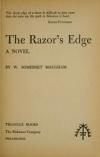 Maugham,
W. Somerset. The Razor's Edge.
London: Heinemann & Garden City, NY: Doubleday, 1944, and later
reprints.
Maugham,
W. Somerset. The Razor's Edge.
London: Heinemann & Garden City, NY: Doubleday, 1944, and later
reprints.
The Razor's Edge is a novel set in the 1920s and 1930s, tracing the intimate lives of representative British and American upper class. The announced intent is to highlight the experiences of an American war verteran who rejects the society of the rich to embrace a vagabond quest for spirituality that ultimately takes him to India.
But the novel only focuses on the protagonist Larry Darrell
occasionally and with little insight. More F. Scott Fitzgerald than
Herman Hesse -- if not harkening back to Victoria melodramatist --
Maugham (1874-1965) here extends his own dabblings into spiritual
India, in the
fashion of many 20th-century discontented and restless British and
Americans. But the protagonist is completely overshadowed by the other
characters. Maugham himself appears as partially-omniscient narrator,
clearly more interested in the domestic relations of his stock figures:
the rich Chicago matron Bradley and her sharp-witted, eligible daughter
Isabel,
the old financier Maturin and his dull-witted son Gray, the chattering
hypocrite Templeton, the occasional Larry, haunted by the death of a
war buddy, giving up high society to "loaf." The author cannot put more
articulate words into poor Larry's thoughts.
The dialogue is what merciful critics would consider scintillating, clever, polite. It is filled with art, wine, continental nobility, dinner and cocktail parties, name-dropped hotels, restaurants, and streets of London-Paris-the Riviera, page after tedious page of such talk. Into this whirlwind, overwhelmed Larry shunts to and fro unconvincingly distracted by his wanderings and vague aspirations, for Larry is nothing but the author himself torn between what he likes of his lifestyle and what he finds curious, such as exotic fakirs and mysterious powers. For example, Larry has learned a technique of hypnosis (so the naive but wealthy characters assume) that cures Isabel's husband Gray of migraines. Larry learned this from a swami, so we are told. Spirituality? Amusingly, the high-minded Larry refuses alcohol for tea on first reuniting with his American friends, but a few chapters later he is gulping down bacon and eggs with a beer for breakfast.
The influencial holy man (not the hypnotist swami) Larry discovers in India is clearly Ramana Maharshi, as described by the author. Maugham himself visited Ramana's ashram on a journey to India in 1938. Thus the degree of Maugham's identification -- at least in this sphere -- with the Larry character, in an era when many British and Americans trekked to India, before the obvious "commodification of Eastern spirituality," as one reviewer has put it.
The title of the novel alludes to an Upanishad saying that evokes the fragility of the attainment that the protagonist of The Razor's Edge (and its author) seek. In the novel's concluding deus ex machina (not the first), the narrator reports that Larry has returned to a U.S. city somewhere, not to be heard of again.
Such a version
of a solitary's quest may have been adequate for the tastes of 1940s
audiences (Maugham's novel was a bestseller), but it
reads hollow today.
¶
